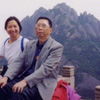Journal Entries
previous
next
Bon Journal
Chinese selling tactics
My first boss, an American of Filipino descent, had once scolded me for not having the business sense of a Chinese. I had no idea that Chinese people, especially those from Shanghai, were known for their shrewd business acumen. After my recent trip to mainland China, I now understand that doing business is a way of life, so ingrained in the Chinese, that even decades of communism could not wipe it out.
The saying "a fool and his money are soon parted" befits the tourist who visits mainland China thinking that everything is cheap. Everything is in fact inflated 1,000 % according to my knowledgeable friend from Canton. Most people compare the offered price with what they could get at home and conclude that it's worth it. Some are taught to counter the first price by halving it. The seller may retaliate with a price in between the two. And the impatient, greedy, and gullible tourist would accept and make the purchase, satisfied that he's got a discount.
In contrast to the Far East, bargaining is just not the done thing in Western Europe and the United States. People would look at you funny if you try to negotiate the set and offered price. Bartering is even more unheard of. I once tried to get a car mechanic to fix my new license plate in exchange for a piece of my freshly baked banana bread. He thought it was a come-on and tried to ask me on a date.
Any sort of bargaining or bartering in these parts of the world is limited to the very simplistic kind. Any attempt to bargain or barter may earn you a reputation of being a cheapskate or a difficult person. I've learned to shop around but not to spend time trying to get a discount.
It's easy to disregard the hustlers if you don't speak their language. In mainland China, however, I listen to their woes and become sympathetic to their hard lives. So I give in more easily than say in South America or Africa.
I've come to the conclusion that selling is about maximising absolute gain. A seller will try anything to get the maximum price without feeling guilty. It's hard to feel guilty towards a tourist who will never return. And it's easy to want to get the most out of someone who looks wealthier and happier than you. Meanwhile, for the buyer, it's about minimising relative loss. Note the "absolute" versus "relative." Buyers anchor on the original price and the relative savings made by subsequent offers.
The Chinese sellers I encountered inflated the prices to just below what we'd expect at home. Then they go through a ritual of testing us to see how much we want the item. If they see that we want it very much, they would slow down the bargaining process. If we don't want it but have got the money, we may be lured into buying it just because we think it's so cheap.
Another tactic I observed was that of incremental selling. They first hook you in with one item. Then they get you to buy something else that's related. Before you know it, you've parted with ten times more than what you had first been offered. So you buy item A, and then you're told you've got to have item B for A to work, and so on. The momentum of selling is such that you don't realise that you don't want any of it until you get home.
Being in a tour group with its demanding schedule exacerbates the process. You have to make a decision quickly. And the seller uses aggressive tactics to get you to commit before you're ready to.
My poor father was subject to aggressive tactics of the two men who carried him in a sedan up the mountain. Against our local tour guide's instructions, my father ended up tipping the sedan carriers, not once but twice. Why? The men moaned and groaned of how hard it was to earn a living. They stopped half way before the hotel and asked my father for a tip. Concerned that he may not get back, he asked them to take him to the bank to fetch some money. As if this wasn't enough, the two men returned the next day to ask for more money. Having run out of local currency, he gave them what's left of his US$ and Taiwanese $. When I ended my walk, one of the men came up to me to ask for a tip for carrying my father. He was also asking other tourists to help him exchange the foreign currency. I told him that I too had to work hard for a living, and that I would charge him a tip for exchanging his money into the local currency Ren Ming Bi.
Don't they have any dignity? How could my father enjoy the magnificent scenery? He paid them to silence them. He paid them to ensure they took him to the hotel safely. He paid them out of pity. The men were merely maximising absolute gain. They had all the time in the world and no qualms about spoiling my father's sedan ride.
10 June 2002 Monday

Recommend this page to a friend:
